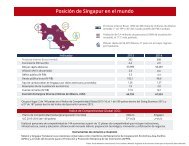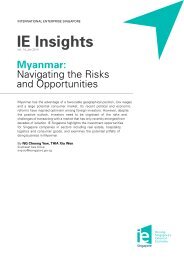basic-guide-to-exporting_Latest_eg_main_086196
basic-guide-to-exporting_Latest_eg_main_086196
basic-guide-to-exporting_Latest_eg_main_086196
Create successful ePaper yourself
Turn your PDF publications into a flip-book with our unique Google optimized e-Paper software.
under the UCC. Older works may also be protected as a result of simultaneous publication in aBern country or by virtue of bilateral obligations. The requirements and protection vary fromcountry <strong>to</strong> country, so you should investigate them before seeking publication anywhere.NAFTA and Agreement on Trade-Related Aspects of Intellectual Property RightsBoth NAFTA and TRIPs establish minimum standards for the protection of intellectual propertyand the enforcement of those standards. Neither agreement bes<strong>to</strong>ws rights on U.S. intellectualproperty owners. Rather, both agreements ensure that a member state that is party <strong>to</strong> one orboth of the agreements provides a certain level of protection <strong>to</strong> those individuals or companiesprotected under that member state’s laws. Other free trade agreements involving the U.S. includesimilar protections, which is another reason <strong>to</strong> consider FTA countries for inclusion in yourexport plan.Patent LawU.S. patent law differs from the patent laws of most other countries in several important aspects.U.S. patent law grants a patent <strong>to</strong> the first inven<strong>to</strong>r, even if another person independently makesthe invention and files an application first. Most other countries award the patent <strong>to</strong> the inven<strong>to</strong>rwho first files a patent application. The United States also provides a 1-year grace period that doesnot preclude an inven<strong>to</strong>r from obtaining protection after an act that would make the inventionpublic, such as publishing, offering for sale, or using the invention. Many countries, includingmost European countries, lack a grace period that allows an inven<strong>to</strong>r<strong>to</strong> so disclose an invention before filing a patent application. Incountries with an absolute novelty rule, the inven<strong>to</strong>r must file apatent application before making the invention public anywhere.Hence, even the publication of an invention in a U.S. patent grant is adisclosure that can defeat the right <strong>to</strong> obtain foreign patents unlessthe applicant is entitled <strong>to</strong> claim the right of priority under the ParisConvention, as described earlier.Because the United Stateshandles protections differentlyfrom most other countries,things you take for grantedhere in the U.S. might not bethe same when you export.Many countries require that an invention be worked locally <strong>to</strong> retainthe benefit of the patent. Working a patent may require manufactureof the patented goods within the country, or it may be met byimportation of goods covered by the patent, depending on the lawof a particular country. The Paris Convention permits penalties for abuses of patent rights, suchas not working a patent—for example, the right <strong>to</strong> a compulsory license at a reasonable royaltyfollowed by possible forfeiture of the patent when the grant of a compulsory license was notsufficient <strong>to</strong> prevent abuses.For an invention made in the United States, U.S. law prohibits filing abroad without a foreignfiling license from the Patent and Trademark Office unless 6 months have elapsed since a U.S.application was filed. This prohibition protects against transfers of information that might damagethe national security. The penalties for filing abroad without following these requirements rangefrom loss of U.S. patent rights <strong>to</strong> possible imprisonment (if classified information is released).In addition, other export control laws require you <strong>to</strong> obtain a license before <strong>exporting</strong> certaintechnologies, even if no patent application is filed—or they may bar the <strong>exporting</strong> of certainChapter 10: International L<strong>eg</strong>al Considerations113





